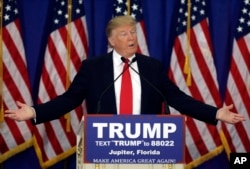Vermont Senator Bernie Sanders scored a surprise victory in Tuesday's Democratic primary in the northern state of Michigan, while Republican Donald Trump widened his lead with victories in Michigan, Mississippi and Hawaii.
Many polls showed former Secretary of State Hillary Clinton heavily favored to win in Michigan, but Sanders got 50 percent of the vote. Clinton did easily win the other Democratic primary held Tuesday in the Southern state of Mississippi.
Sanders said the Michigan victory means his "political revolution" is strong across the country, and that he believes the areas where his campaign is strongest are the ones that have not yet voted.
"As more people get to know more about who we are and what our views are, we're going to do very well," he said.
WATCH: Video report by VOA National Correspondent Jim Malone:
Matt Grossmann, director of the Institute for Public Policy and Social Research at Michigan State University, said a key was the popularity Sanders has with young people, who are often harder for pollsters to reach but turned out to vote in Michigan.
Minority votes
Sanders also reversed some of his earlier struggles with appealing to minorities.
"This is a very important statement that he can compete with Clinton beyond his base of young white liberals, that he can compete for at least some minority votes, that minority voters in the North might vote differently than those in the South," Grossmann said.
Clinton told voters in Cleveland, Ohio -- one of the five states holding a Democratic primary next week -- that she is proud of the campaign she and Sanders are running. She compared it to the Republican campaign, where she said the candidates are tearing each other down.
"Running for president shouldn't be about delivering insults, it should be about delivering results for the American people," Clinton said.
Delegate counts are what ultimately matters in these races with candidates trying to amass the majority they need to secure their party's nomination.
Clinton had a big lead going into Tuesday, and despite losing in Michigan, she earned roughly the same number of the state's delegates as Sanders.
Grossmann said Sanders needs to start winning by 20 percent margins to make up ground.
US Presidential Candidate Delegate Count
Delegate Count
Here is an estimated delegate count for each candidate:
Republicans
Donald Trump: 621
Ted Cruz: 396
John Kasich: 138
Democrats
Hillary Clinton: 1,561
Bernie Sanders: 800
Total delegates needed for party nomination:
Democrats: 2,383
Republicans: 1,237
* As of March 16, 2016
Ohio Governor John Kasich has a similar problem, sitting in fourth place in terms of Republican delegates. He finished third in Michigan, just behind Cruz, with about 24 percent of the vote.
Kasich is banking on scoring a big batch of delegates next week when Ohio holds a winner-take-all primary.
"I think Kasich did well enough for him to go into Ohio and have people consider him a legitimate candidate there," Grossmann said. "The problem has always been where does he go from there and how on Earth does he make up the massive delegate deficit he currently has with all of the candidates but especially with Donald Trump?"
Second place
Cruz sits in second place in terms of Republican delegates and won more with a victory Tuesday in the western state of Idaho. Trump came in second there.
Third in the Republican delegate count is Florida Senator Marco Rubio who had a poor showing Tuesday with distant fourth-place finishes in Michigan and Mississippi. Rubio is also counting on his home state next week to deliver a boost with its 99 winner-take-all delegates.
"I believe with all my heart that the winner of the Florida primary next Tuesday will be the nominee of the Republican party," he told supporters.
Rubio predicted a win, but Grossmann said there is not much of a sign that will happen, and that he thinks if Rubio does not drop out of the race before the March 15 primary, he will do so afterward.
"You'll start to see some of his supporters start to go to Kasich in other states," Grossmann said.
Republican leaders have launched an intense effort to try to stop Trump, saying he is too unpredictable and would lose in November if Clinton is the Democratic nominee.
Several anti-Trump organizations are also spending millions of dollars in the next week on advertisements, mainly in Florida and Illinois.
Dismisses attack ads
But Trump has dismissed those efforts, pointing to his continued success in elections.
"There's only one person who did well tonight -- Donald Trump," he said Tuesday.
Trump predicted victory in Florida, which he called his "second home" and where he holds a lead in polls over Rubio.











